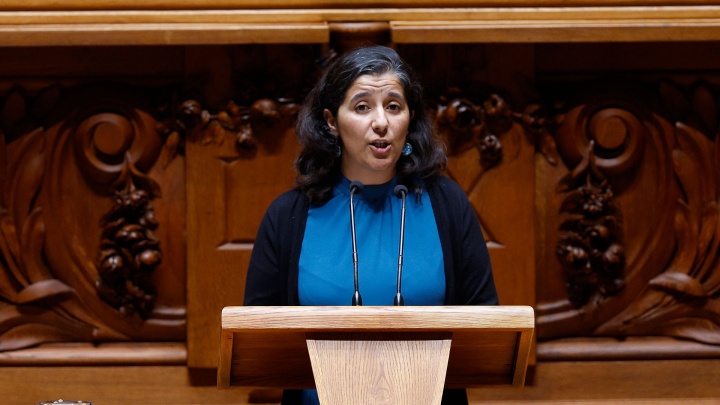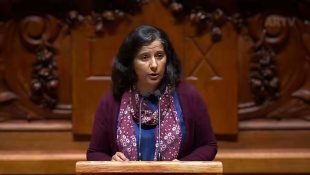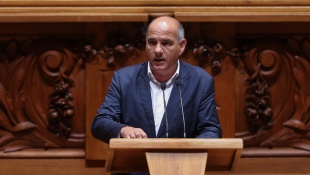It is unusual for the budget debate to end when the Government's resignation has been announced and early elections are scheduled. It is politically significant that, both the PS or right-wing parties, advocate the approval of a budget that will not improve the lives of the workers and people, nor will it ensure better public services, nor more fiscal justice (regardless of the sense of their vote in a few minutes), but there are those who will continue to gain and a lot with the options included in it – the capital, hence so much interest in saving it.
The PCP assumed its own intervention, with concrete solutions to respond to pressing problems that cannot be left waiting.
With different adjustments, in essence, the PCP's proposals were rejected by the PS, alone or accompanied by PSD, IL and CH, jointly or in turn. It is symptomatic that when it comes to ending tax benefits for economic groups or the end of public-private partnerships, or the continuation of privatisations, everyone, PS, PSD, IL and CH reject, in order to guarantee the continuation of accumulation of huge profits for economic groups.
After the PS backed down on the IUC (Circulation Tax), which besides the injustice served to hide all the other options evidenced in the convergence of the PS and the parties to its right with regard to favouring capital. Once again, the PSD found itself at sixes and sevens during the budget debate, with the PS doing what the PSD would have liked to do.
During this debate there were those who said what they wanted, like IL, that between reducing food prices and being an accomplice in the increase in profits of large retail at the expense of wages and pensions, it confirmed that people's real difficulties do not matter, but profits cannot be touched.
On the other hand, there are those who advocated the same interests, but want to appear otherwise, like the Chega. Their mask fell when faced with the need to stop the increase in rents. For Chega, rents can increase to unaffordable values, people are left without a home and until they are evicted, the profits of big landlords and real estate funds cannot be called into question.
During the entire budget debate there was no willingness on the part of the absolute majority of the PS to come up with solutions to improve the purchasing power of workers and pensioners, to retain health professionals in the NHS, to count teachers' service time, to ensure that no one is left without a home, to cut prices of essential goods. The proposals that the PS approved do not change a single millimetre of the budget that was submitted to the Assembly of the Republic.
Just as there was no readiness to increase wages having as reference 15%, and at least 150 euros. There has been no readiness for an effective response to valorise careers, pay and guarantee working conditions for doctors, nurses and other health professionals. It was not ready to valorise the teaching career. Just as when it came to court officials, security forces, or the armed forces to reinforce their rights.
Those for whom the Government was always fully available, in an attitude of subservience of political power to economic power, were the big employers and economic groups.
More inequalities and injustice, more difficulties in the lives of the workers and people. This is the legacy of the absolute majority of the PS. They say the country is better, but the reality is that people live worse. They say that economic indicators are good, but this has no effect on people's lives. They invoke the right accounts, but that doesn't put food on the table, doesn't guarantee the medical appointment, doesn't cover the teacher, or prevent eviction. Correct accounts, but for whom? Only for a small minority that concentrates the wealth created by the work of a vast majority.
After these two years, the absolute majority of the PS was no guarantee of stability, it was a guarantee of instability in the lives of the Portuguese people.
At the threshold of elections, to valorise its governance, the PS needs to highlight, not the period of absolute majority - they are well aware of their responsibilities in the deterioration of living conditions and public services - but the period following the 2015 elections What made the difference in the period after 2015, which defeated the policy of exploitation and impoverishment of PSD/CDS, where many of today’s IL and CH leaders are, was not the PS, but rather the strength and decisive role of the PCP in the defence, restoration and achievement of rights, such as the achievement of free school textbooks, the drop in the value of the social transport pass and the integration of different means of transport, the extra increase in pensions or free daycare centres. It just didn't go any further because the PS didn't want to. As in 2021, it did not want to find solutions to the central problems, wages and pensions, healthcare and housing. If the PCP's proposals had been adopted at that time, the situation would be different today, for the better.
Life has proved that it is not in the PS, nor in the PSD, in the CDS, in IL and in CH that the workers and people will find answers to their problems. Nor is the PS, the promoter of right-wing policies, that will break with this option.
It's time to change policies instead of changing the players so that everything stays the same or worse. It's time to change policies, for an alternative, patriotic and left-wing policy, which:
-
Valorises wages, careers and professions and repeals grievous labour legislation norms;
-
Valorises pensions and ensures a public network of nursing homes;
-
Promotes children's rights and ensures a public network of daycare centres and the universality of family allowances;
-
Defends the social functions of the State and public services and strengthens the National Health Service, Public Schools and social protection;
-
Promotes free cultural creation and fruition, meeting the 1% goal for culture;
-
Ensures the right to housing and mobility, expanding the offer of public transport;
-
Guarantees access to justice, and valorises professionals from civil protection, security forces and services, armed forces and justice,
-
Valorises national production, regains public control of companies and strategic sectors, supports MSMEs and fiscal justice;
-
Fixes and cuts prices, especially for food, energy and telecommunications;
-
Defends the environment, protects ecosystems and biodiversity, guarantees access to water as a right and not as a business;
-
Fights corruption, privatisations, favouritism of capital and puts an end to the promiscuity between political power and economic power;
-
Affirms national sovereignty and independence, with a foreign policy of peace and cooperation between peoples.
Holding legislative elections is an opportunity to break with this path of inequalities and injustice, it is an opportunity to build a political alternative capable of implementing alternative policies, which improves the living conditions of the people, progress, justice and development.
While we are here, the workers are out on the street, they did not wait and fight. They fight for an increase in wages and pensions, they fight against the increase in the cost of living, they fight for the repeal of grievous labour legislation, they fight for the right to housing, they fight for a decent life!
It is in the hands of each worker, pensioner, woman and young person to join forces to make the dream come true.




